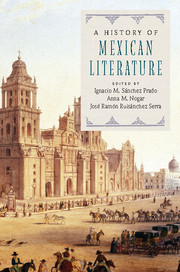Book contents
- Frontmatter
- Contents
- List of contributors
- Introduction
- PART I COLONIAL LITERATURE
- PART II THE NINETEENTH CENTURY
- PART III TWENTIETH AND TWENTY-FIRST CENTURIES
- 15 The Ateneo de la Juventud: The Foundations of Mexican Intellectual Culture
- 16 Regimes of the Avant-garde: Colonialists, Stridentists, Proletarians, Surrealists, Contemporáneos, and Independent Rupture (1920–1950)
- 17 The Institution of Fiction: From Yáñez, Rulfo, and Fuentes to Pitol and Del Paso
- 18 Octavio Paz: Literature, Modernity, Institutions
- 19 Mexican Poetry after the Avant-garde
- 20 Nonfictions: Essay, Criticism, and Chronicle
- 21 Balancing Acts: Twentieth- and Twenty-First-Century Mexican Theater
- 22 Women Writers in the Land of “Virile” Literature
- 23 The Hidden Histories of Gender: LGBTQ Writers and Subjectivities in Mexico
- 24 Mexican Literature in the Neoliberal Era
- PART IV MEXICAN LITERATURE BEYOND BOUNDARIES
- Index
- References
24 - Mexican Literature in the Neoliberal Era
from PART III - TWENTIETH AND TWENTY-FIRST CENTURIES
Published online by Cambridge University Press: 05 July 2016
- Frontmatter
- Contents
- List of contributors
- Introduction
- PART I COLONIAL LITERATURE
- PART II THE NINETEENTH CENTURY
- PART III TWENTIETH AND TWENTY-FIRST CENTURIES
- 15 The Ateneo de la Juventud: The Foundations of Mexican Intellectual Culture
- 16 Regimes of the Avant-garde: Colonialists, Stridentists, Proletarians, Surrealists, Contemporáneos, and Independent Rupture (1920–1950)
- 17 The Institution of Fiction: From Yáñez, Rulfo, and Fuentes to Pitol and Del Paso
- 18 Octavio Paz: Literature, Modernity, Institutions
- 19 Mexican Poetry after the Avant-garde
- 20 Nonfictions: Essay, Criticism, and Chronicle
- 21 Balancing Acts: Twentieth- and Twenty-First-Century Mexican Theater
- 22 Women Writers in the Land of “Virile” Literature
- 23 The Hidden Histories of Gender: LGBTQ Writers and Subjectivities in Mexico
- 24 Mexican Literature in the Neoliberal Era
- PART IV MEXICAN LITERATURE BEYOND BOUNDARIES
- Index
- References
Summary
In the context of a book such as A History of Mexican Literature, the discussion and selection of works from a literary period in progress is, at the very least, a problematic endeavor. It is always possible that the most recognized works of the contemporary epoch will slowly slide into oblivion – or that the masterworks that capture the present in all its intensity are being written unbeknownst to literary critics. Mexican literature of the neoliberal era, which roughly starts with the cultural policies of the administration of Carlos Salinas de Gortari (1988–1994) and continues to this day, is still a work in progress. To account for it, one must mainly focus on the processes that have defined literature as a set of institutional undertakings that differ in fundamental ways from the postrevolutionary period covered in the other articles in this section, as well as on the aesthetic, ideological, and cultural consequences of these endeavors in works currently considered significant. Some of the phenomena that unfold throughout the 1990s include: the emergence of the Consejo Nacional para la Cultura y las Artes (Conaculta) and its impact on funding for writers; the corporate consolidation of the editorial world and the emergence of independent publishers against the grain of corporatization; the decentralization of literary writing away from the institutions of Mexico City; and the emergence, in particular, of a strong current of writing in northern Mexico and the changes brought forward by the Internet in contemporary writing.
Conaculta is an institutional body of the Mexican government that concentrates the financing and promotion of a large percentage of artistic and cultural production in Mexico. It was created in 1988 in order to coordinate cultural activities of the federal government, and it exists as a “decentralized” organism under the purview of the Secretaría de Educación Pública (SEP). As far as literature is concerned, Conaculta has developed substantial efforts in different parts of the process. Through its fellowship arm, the Fondo Nacional para la Cultura y las Artes (FONCA), it sustains an extensive system of fellowships devoted to the financing of literary artists, ranging from new writers under the age of thirty-five (called Jóvenes Creadores) to authors with a substantial career (in the Sistema Nacional de Creadores Artísticos, under which writers may even get a lifetime fellowship).
- Type
- Chapter
- Information
- A History of Mexican Literature , pp. 365 - 378Publisher: Cambridge University PressPrint publication year: 2016



